by Lisa Cooke | May 9, 2015 | 01 What's New, Adoption, Book Club, History, images, Listeners & Readers, Memory Lane, Travel, United States
 We’ve heard from many of you that the best-selling novel Orphan Train by Christina Baker Kline, featured in our Genealogy Gems Book Club, has piqued your interest in that sad chapter in U.S. and Canadian history. So I thought I’d share this comment from Jenna Mills on our Genealogy Gems Facebook page:
We’ve heard from many of you that the best-selling novel Orphan Train by Christina Baker Kline, featured in our Genealogy Gems Book Club, has piqued your interest in that sad chapter in U.S. and Canadian history. So I thought I’d share this comment from Jenna Mills on our Genealogy Gems Facebook page:
“I’ve become very interested in orphan trains since I heard the interview with the author on your podcast. Fascinating and sad. I’ve since found that that over 250,000 kids are estimated to have been put on a train. 250,000!!!
 The National Orphan Train Complex [a museum] is in Concordia, Kansas, so of course a visit there will be forthcoming. I’m halfway through the book and love it. What has really piqued my curiosity is that my great-grandmother adopted a boy while living in Amherst, Nebraska. The railroad doesn’t go through there anymore but did in that time period. I may be taking a trip down a rabbit hole, but this is so fascinating.”
The National Orphan Train Complex [a museum] is in Concordia, Kansas, so of course a visit there will be forthcoming. I’m halfway through the book and love it. What has really piqued my curiosity is that my great-grandmother adopted a boy while living in Amherst, Nebraska. The railroad doesn’t go through there anymore but did in that time period. I may be taking a trip down a rabbit hole, but this is so fascinating.”
Thanks, Jenna! We’re also aware of an orphan train museum in Louisiana and this lovely summary from an Iowa historical society about riders who landed in their little town. Recently we pinned an image of an old orphan train rider doll on Pinterest.
Follow Lisa Louise’s board Genealogy Gems Book Club on Pinterest.
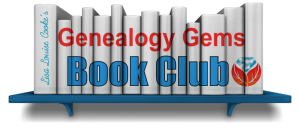 We invite you to follow the FREE no-commitment, no-fuss Genealogy Gems Book Club. Every quarter we feature our favorite family-history-friendly fiction and nonfiction titles AND exclusive interviews with their authors!
We invite you to follow the FREE no-commitment, no-fuss Genealogy Gems Book Club. Every quarter we feature our favorite family-history-friendly fiction and nonfiction titles AND exclusive interviews with their authors!
by Lisa Cooke | Jun 9, 2017 | 01 What's New, Archives
A lot of the best information about our ancestors’ lives is buried in an archive–NOT indexed online! Melissa Barker explains what an archive is and how to find one that might reveal secrets from your family history.
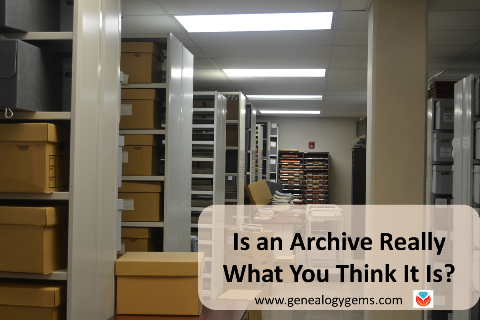
International Archives Day is Friday, June 9! Genealogy Gems contributing archivist Melissa Barker tells us what an archive IS and how to find one.
Recently, I was asked “What is an archive?” I was a bit surprised by this question since it came from a genealogist. I thought all genealogists knew about archives!
What exactly is an archive?
An archive is defined by the Society of American Archivists as: An organization that collects the records of individuals, families, or other organizations. The “organization” they are talking about could be any organization. It doesn’t have to be only a county archive, such as the Houston County, Tennessee Archive, or a state archives, like the California State Library and Archives. Archives include:
- A historical society that collects and preserves local records is also considered an archive.
- A genealogical society that accepts donations of family records is an archive.
- A museum that has exhibits and displays may also have records collections and would be considered an archive.
- Local public libraries that have genealogy rooms with records in them are archives.
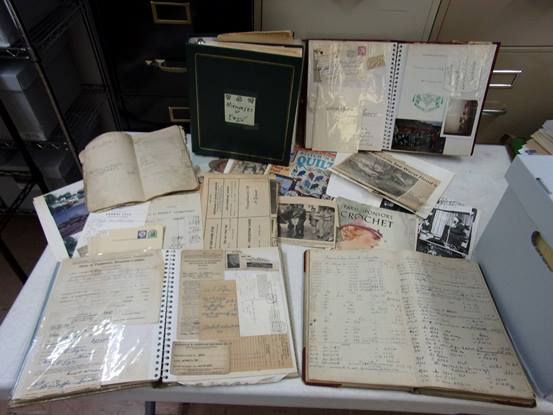 The term “archive” is not solely used to represent a county or state archive. Any organization that accepts, collects and preserves historical and genealogical documents, records, memorabilia and artifacts is considered an archive, even if they don’t have the word “archive” in their title.
The term “archive” is not solely used to represent a county or state archive. Any organization that accepts, collects and preserves historical and genealogical documents, records, memorabilia and artifacts is considered an archive, even if they don’t have the word “archive” in their title.
There are many different kinds of archives that can be accessed by genealogists. I always say, “There is an archive for everything.” Just because the building doesn’t have the word “archive” on it, don’t discount the fact that there is a “place” where there are historical and genealogical records being preserved or at the very least stored.
Tips for finding and visiting archives
The next time you are doing research on your ancestor in the area where they lived…
Ask around: There is always someone in the local area that knows the local history and knows many of the local families and most importantly; these people usually know where to find the records! This person may even be able to tell you about the family you are researching.
Ask around in the community, call the local library or the local Chamber of Commerce and ask, “Who is the local historian, who is the one knows about the families and history of the area?” I guarantee that you will be given a name. Ask where the records are stored or archived. Contact the local historical and/or genealogical society.
Be prepared to get dusty: There have been many times when I had arrived at the place where I was told the records were located. I was then shown a closet, the attic or basement and I was left to my own research devices to go through boxes and shelves of records. You have to ask the questions and you may even have to do some sleuthing in the local areas your researching in to locate the records.
Don’t leave any stone unturned. The records you are looking for could be sitting in boxes, archived or not, just waiting for you to find them. Remember: It’s not all online, contact or visit and archive today!
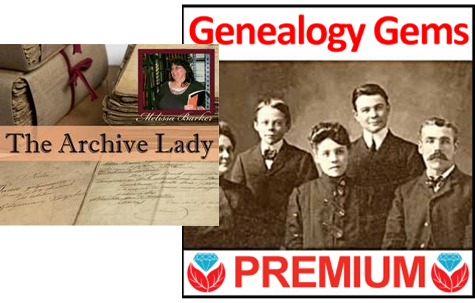 The Archive Lady, Melissa Barker shares a short archiving segment in the Genealogy Gems Premium Podcast, available to Genealogy Gems Premium website members. Premium website members have access to the entire Premium Podcast archive of more than 200 episodes AND more than two dozen video classes by internationally-known genealogy educator Lisa Louise Cooke. Genealogy Gems Premium Membership offers so many fun and innovative ways to do genealogy! Click here and start enjoying it today.
The Archive Lady, Melissa Barker shares a short archiving segment in the Genealogy Gems Premium Podcast, available to Genealogy Gems Premium website members. Premium website members have access to the entire Premium Podcast archive of more than 200 episodes AND more than two dozen video classes by internationally-known genealogy educator Lisa Louise Cooke. Genealogy Gems Premium Membership offers so many fun and innovative ways to do genealogy! Click here and start enjoying it today.
by Lisa Cooke | Sep 3, 2013 | 01 What's New, Inspiration, Irish, Who Do You Think You Are?
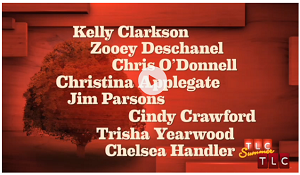 If you’re like me, you were happy to see the return of Who Do You Think You Are? to our TV lineup this past summer. You might have thought to yourself as you watched, “They make it look so easy! I wonder how long it took them to find that record?”
If you’re like me, you were happy to see the return of Who Do You Think You Are? to our TV lineup this past summer. You might have thought to yourself as you watched, “They make it look so easy! I wonder how long it took them to find that record?”
Well there have been some great articles written by the researchers behind the scenes at WDYTYA? For example, this post tells how it took more than 1000 hours of research for Cindy Crawford’s one-hour episode.
“It took months to research Cindy’s tree,” says the post at ProGenealogists, Ancestry’s official research arm. “Only the records that were essential stepping stones could be included in her story, and a few important steps we took along the way didn’t make the final cut.”
A post on Matthew Broderick’s episode, which aired in 2010, introduces us to using military records to find our family history. Matthew appeared in the 1989 Civil War film “Glory” but his great-great-grandfather experienced the real thing: he died while serving as a Union soldier. Other episodes bring up other episodes in the history of the world: Lisa Kudrow’s past includes the horrors of the Holocaust, Rosie O’Donnell’s covers the experience of a poor family in an Irish workhouse that was able to escape to Canada; Emmitt Smith’s probes the dark depths of African-American slavery. The post on Emmitt is a particularly detailed account of how this family was found.
You can click on similar posts relating to other WDYTYA guests, both past and present: Chris O’Donnell, Zooey Deschanel, Chelsea Handler, Christina Applegate, Kelly Clarkson, Tim McGraw, Vanessa Williams, Sarah Jessica Parker, Lisa Kudrow, Brooke Shields, and Susan Sarandon.
If you haven’t tuned in to WDYTYA yet, check it out on TLC on Tuesdays at 9pmEST. Or learn more about it and watch episodes at TLC’s website.
by Lisa Cooke | Apr 30, 2016 | 01 What's New, Records & databases
 How great to see these new genealogy records online! Those with German roots will especially want to check out new resources on Ancestry.com.
How great to see these new genealogy records online! Those with German roots will especially want to check out new resources on Ancestry.com.
ENGLAND CHURCH. Findmypast.com has updated its collections of church baptismal and marriage records for Dorset, England. Those collections now together number about a million records.
GERMANY – MILITARY. Over 400,000 records are part of a new Ancestry.com collection of Bremen military lists (1712-1914). According to the collection description, “The core of the collection are the muster rolls created by recruiting commmissions including actual musters from 1894-1917 for men born between 1874 and 1899. These records are arranged in chronological-alphabetical order and contain detailed information about male military personnel in the city.”
GERMANY – CHURCH. An enormous collection of Lutheran baptisms, marriages and burials is now searchable on Ancestry.com. You’ll find over 24 million records from “parish registers from numerous Protestant communities in Baden, today part of the German state of Baden-Württemberg…[and]some communities to the north, such as Wiesbaden in adjacent Hessen.” Another new Ancestry.com collection contains over a million birth, marriage and death records taken from weekly church reports in Dresden, Germany for 1685-1879.
GERMANY – IMMIGRATION TO U.S. A new database on Ancestry.com catalogs German immigrants to the U.S., 1712-1933.
IRELAND NEWSPAPERS. Over half a million new Irish newspaper articles have been added at Findmypast.com. According to a company press release, “Significant updates have also been made to seven existing titles” and a new title from Northern Ireland for 1891-1896 is a “must-read for anyone with ancestors from that part of the country.”
U.S. – NEVADA DEATHS. Just over a quarter million records are part of a new Ancestry.com collection of Nevada death records for 1911-1965. The indexed images are state death certificates.
 Got German roots? Click here to read an article on German newspapers in the U.S.
Got German roots? Click here to read an article on German newspapers in the U.S.
by Lisa Cooke | Nov 21, 2013 | 01 What's New, Book Club, Inspiration, Photographs, Research Skills, Technology
Ever wish there was a really easy directory for U.S. digital libraries and archives, organized by state with great commentary about the content? There  is. But it’s not in a place most genealogists would look.
is. But it’s not in a place most genealogists would look.
Open Education Database.org has a blog post called “250+ Killer Digital Libraries and Archives.” The post is a LONG annotated list of digital libraries and archives that don’t require library memberships, subscriptions, etc. to access. (In other words, open access.) It’s organized by U.S. state, so you can scroll down to the states of most interest to your research.
Digital archives and libraries give us remote, fingertip access to original and published materials we might never otherwise know about or be able to access. Look here for books, government documents, photographs, manuscript items, memorabilia, audio recordings and more. This is a great resource for genealogists. Click the link above to get all the info.
 We’ve heard from many of you that the best-selling novel Orphan Train by Christina Baker Kline, featured in our Genealogy Gems Book Club, has piqued your interest in that sad chapter in U.S. and Canadian history. So I thought I’d share this comment from Jenna Mills on our Genealogy Gems Facebook page:
We’ve heard from many of you that the best-selling novel Orphan Train by Christina Baker Kline, featured in our Genealogy Gems Book Club, has piqued your interest in that sad chapter in U.S. and Canadian history. So I thought I’d share this comment from Jenna Mills on our Genealogy Gems Facebook page: The National Orphan Train Complex [a museum] is in Concordia, Kansas, so of course a visit there will be forthcoming. I’m halfway through the book and love it. What has really piqued my curiosity is that my great-grandmother adopted a boy while living in Amherst, Nebraska. The railroad doesn’t go through there anymore but did in that time period. I may be taking a trip down a rabbit hole, but this is so fascinating.”
The National Orphan Train Complex [a museum] is in Concordia, Kansas, so of course a visit there will be forthcoming. I’m halfway through the book and love it. What has really piqued my curiosity is that my great-grandmother adopted a boy while living in Amherst, Nebraska. The railroad doesn’t go through there anymore but did in that time period. I may be taking a trip down a rabbit hole, but this is so fascinating.” We invite you to follow the FREE no-commitment, no-fuss Genealogy Gems Book Club. Every quarter we feature our favorite family-history-friendly fiction and nonfiction titles AND exclusive interviews with their authors!
We invite you to follow the FREE no-commitment, no-fuss Genealogy Gems Book Club. Every quarter we feature our favorite family-history-friendly fiction and nonfiction titles AND exclusive interviews with their authors!

 The term “archive” is not solely used to represent a county or state archive. Any organization that accepts, collects and preserves historical and genealogical documents, records, memorabilia and artifacts is considered an archive, even if they don’t have the word “archive” in their title.
The term “archive” is not solely used to represent a county or state archive. Any organization that accepts, collects and preserves historical and genealogical documents, records, memorabilia and artifacts is considered an archive, even if they don’t have the word “archive” in their title.

 How great to see these new genealogy records online! Those with German roots will especially want to check out new resources on Ancestry.com.
How great to see these new genealogy records online! Those with German roots will especially want to check out new resources on Ancestry.com.
 is. But it’s not in a place most genealogists would look.
is. But it’s not in a place most genealogists would look.